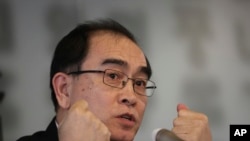Prominent North Korean defector Thae Yong-ho, who is running for a seat in South Korea’s legislature, says human rights should remain at the forefront of any effort to improve relations with Pyongyang.
Speaking to a group of foreign journalists Wednesday in Seoul, Thae criticized those in South Korea whom he accused of “trying to appease” the North by not bringing up its human rights abuses.
“They are going back to the approach of economy first and human rights later... I believe that is very unjust,” said Thae, a former North Korean diplomat who defected to the South in 2016.
The comments appeared to be an implicit criticism of the government of South Korean President Moon Jae-in, who has attempted to improve inter-Korean relations through a series of economic and other projects.
Thae, the former deputy ambassador to Britain, is the highest-level North Korean defector in years. Last week he announced he would run for a National Assembly seat in April elections as a member of the main conservative opposition party.
Thae said his main "triggering point" for entering politics was South Korea’s forced repatriation of two North Korean fishermen in November.
“This is really wrong, even if they’re criminals. Because they wanted to stay here. But they were forcibly sent back,” said Thae. “We should save the people who want to be saved. That’s humanity.”
South Korea usually grants asylum to North Koreans, but quickly returned the fishermen, saying they had killed their captain and 15 other crewmen. Many rights groups said the move amounted to sending the men to almost certain death in North Korea.
Since moving to the South, Thae has been highly critical of the North Korean government, which in return has dismissed him as “human scum.”
The 57-year-old has filled Seoul lecture halls, written a regular newspaper column, and is a sought-after voice in local and international media for his insights into the North Korean diplomatic apparatus.
More recently, Thae has begun criticizing the South Korean government. Now, he is doing so as a formal member of the opposition, which is badly divided following the 2017 impeachment of conservative President Park Geun-hye.
If elected, it’s not clear how much power Thae will be be able to amass in the National Assembly. But he could emerge as a prominent critic of the government — and one that is able to attract international media attention, thanks in part to his unique background and ability to speak English and Mandarin.
“Becoming an MP is a logical way of making his voice heard,” says Remco Breuker, a Korea specialist at Leiden University in the Netherlands. “He'll have a dedicated platform now, which he hadn't before.”
“He brings legitimacy, even if he isn't strictly speaking representing any North Korean refugees,” Breuker added.
Just one other North Korean defector has become a National Assembly member: Cho Myung-chul, who was assigned a seat in 2012 as a member of a major conservative party.
But if Thae wins, he would be the first defector to occupy a so-called “constituency seat,” which would give him more leverage and potentially allow him to be a long-term force in parliament.
At his press conference Wednesday, Thae said his main priority will be his local constituents. But he said he will also work to improve the plight of North Korean defectors, many of whom feel marginalized in South Korean society. “
This is also a great opportunity to show the North Korean people our democracy and freedom,” he said.




